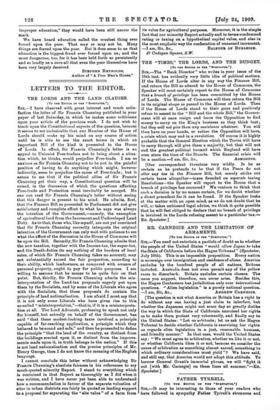LETTERS TO THE EDITOR.
THE LORDS AND THE LAND CLAUSES. !To THZ ELHTOH Or TIM " SrICTATOR.."J SIR,—I have observed with great interest and much satis- faction the letter of Sir Francis Channing published in your paper of last Saturday, in which be makes some criticisms upon your article of the previous week. I do not wish to touch upon the Constitutional aspects of the question, because it seems to me undesirable that any Member of the House of Lords should make up his mind on any course of action until he is able to see the exact terms in which an important Bill of the kind is presented to the House of Lords. In effect, Sir Francis Channing's letter is an appeal to Unionist Free-traders not to bring about a situa- tion which, be thinks, would prejudice Free-trade. I am as anxious as Sir Francis Charming not to be put in the painful position of having to do anything which might, however indirectly, seem to prejudice the cause of Free-trade; but it seems to me that if the political allies of Sir Francis Channing get their way, a Constitutional question will be raised, in the discussion of which the questions affecting Free-trade and Protection must inevitably be merged. No one can read Sir Francis Channing's letter without seeing that this danger is present to his mind. He admits, first, that the Finance Bill as presented to Parliament did not give satisfactory and complete effect to what he says was always the intention of the Government,—namely, the exemption of agricultural land from the Increment and Undeveloped Land Duty. As to that, those who, like myself, are not yet convinced that Sir Francis Channing correctly interprets the original intention of the Government can only wait with patience to see what the effect of the discussion in the House of Commons will be upon the Bill. Secondly, Sir Francis Channing admits that the new taxation, together with the Income-tax, the super-tax, and the Death-duties (to say nothing of the burdens of local rates, of which Sir Francis Channing takes no account), may not substantially exceed the fair proportion, according to their ability, which landowners, as compared with owners of personal property, ought to pay for public purposes. I am willing to assume that he means to be quite fair on that point. But, thirdly, Sir Francis Channing admits the mis- interpretation of the Land-tax proposals eagerly put upon them by the Socialists, and by some of the Liberals who agree with the Socialists, that these proposals do contain the principle of land nationalisation. I am afraid I must say that it is not only some Liberals who have given rise to this so-called " misinterpretation,"—that is, if it is a misinterpreta- tion at all. The Lord Advocate, professing to speak not only for himself, but actually on behalf of the Government, has said "that these modest-looking taxes involved a principle capable of far-reaching application, a principle which they believed to be sound and safe," and then he proceeded to define the principle "that the land of the country, as distinct from the buildings erected upon it, as distinct from the improve- ments made upon it, in truth belongs to the nation." If this is not land nationalisation and the precise principles of Mr. Henry George, then I do not know tha meaning of the English language.
I cannot conclude this letter without acknowledging Sir
Francis Channing's absolute fairness in his references to my much-quoted minority Report. I stand to everything which is contained in that Report as thoroughly as I did when it was written, and I have never yet been able to understand bow a recommendation in favour of the separate valuation of sites in urban districts can fairly be quoted as lending support to a proposal for separating the "site value" of a farm from
its value for agricultural purposes. Moreover, it is the simple fact that our minority Report actually and in terms condemned rating or taxing on a hypothetical capital value, and also in the most emphatic way the confiscation of unearned increment.


































 Previous page
Previous page